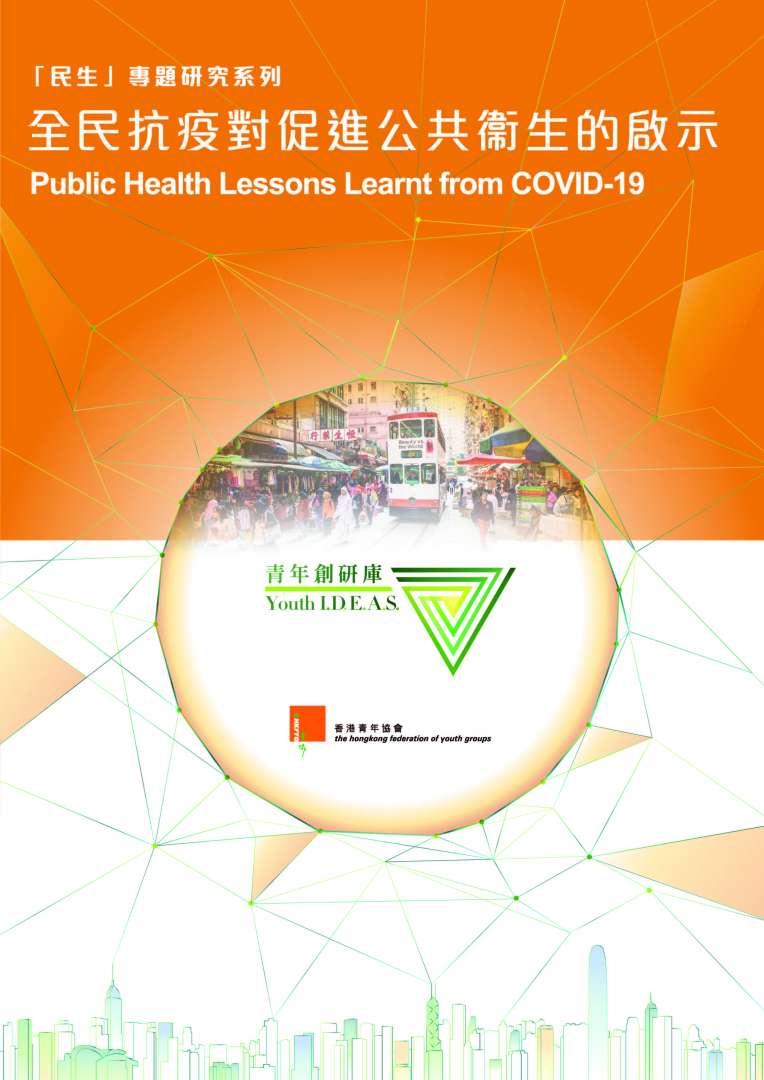Public Health Lessons Learnt from COVID-19
Youth I.D.E.A.S. 56
Livelihood
Public Health Lessons Learnt from COVID-19
11 January, 2021

The COVID-19 Pandemic in 2020 resulted globally in over 82.6million confirmed cases and 1.8million deaths; Hong Kong had a toll of 8,846 cases and 148 deaths. This has highlighted the issue of public health for the first time since 2003.
Having the experience of dealing with SARS in 2003, the public health of Hong Kong has since been gradually improving. This has included disease-prevention and developing public health education. Since the start of COVID-19, Hong Kong citizens in general took measures to prevent infection promptly and conscientiously. Some even initiated community-led movements to protect the community’s health: searching for masks overseas and delivering them to those in need for free; forming online information platforms to educate the public on ways to maintain hygiene. These have shown the high level of public health awareness and activism of civic society to help fight the virus, which is worthy of recognition and appreciation.
As the pandemic becomes more prolonged and case levels fluctuate, not only does it continue to pose a threat to the physical health of everyone in Hong Kong, but also unprecedentedly challenges their mental health. At the very beginning of the pandemic, citizens were fearful of the virus. As strict social distancing and infection control measures were instigated, enormous psychological stress has been generated among the population, leading to low morale and a lack of motivation to fight COVID-19. To effectively control the pandemic and prevent the spread of the virus in the community, it is essential that people continue to actively participate and cooperate in fighting the virus. How to help the public regain their motivation to keep fighting the pandemic so as to maintain their health is the question that the Government should address.
Many in Hong Kong are hopeful that immunisation will soon bring an end to the pandemic. However experts say that control measures will have to be maintained until the vaccination coverage rate is high enough. As such, relying on the health system will not be enough for the public to sustainably deal with the virus.
As it is likely the pandemic will last much longer, this research aims to understand (and improve), the current level of the public’s health awareness/ literacy, and to maintain their involvement in tackling the virus. It also aims to review the government’s measures to combat the virus, support the community, and improving the effectiveness of the government’s public-health measures based on lessons learnt throughout 2020.
Between 5th November and 27th November 2020, this research collected data through three methods, including an on-site survey that interviewed 806 local residents (aged 18-65), 20 case studies of youth (aged 18-35), and interviews with 5 scholars and persons-in-charge of related services.
Discussion
- Hong Kong citizens’ public health awareness in general is quite high, which is significant in controlling the spread of disease.
- As the duration of the pandemic prolongs and fluctuates, it has posed an unprecedented challenge to the public’s mental health.
- A lot of citizens have pandemic fatigue. Helping them to regain motivation to take infection-control measures will be the key to sustain the fight against the virus.
- The hygiene conditions of the disadvantaged is relatively poor as some of them lack public health awareness.
- The public in general are not satisfied with the government’s performance in combating the virus, particularly with border control measures that are thought to be too deficient; constantly changing regulations have caused both inconvenience for businesses and citizens’ daily lives.
- Most citizens are willing to participate in vaccination, but not in using “LeaveHomeSafe” due to concerns about privacy protection.
- A lot of individuals and civic organisations actively participated in and/or organised community-led activities to combat the virus, making a contribution to safeguard the community’s public health, which shows the significance of a vibrant civic society.
Recommendation
- Harness the power of civic society. Stay transparent with the information about the vaccines. Enhance public education to promote vaccination programmes.
- Integrate various health-related electronic systems into one single digital platform to allow citizens to better manage their medical records, building a solid foundation for future primary-care expansion.
- Establish a detailed alert system and action plan, customised to COVID-19.
- Submit the “Leave Home Safe” app for an independent privacy assessment and information security audit. List out the purposes, retention and liability of collecting personal data, highlighting that the data is only for purpose of controlling the spread of COVID-19.
- Unify the human resources devoted to quarantine monitoring. Improve the efficacy of ’StayHomeSafe’ mobile app for those undergoing home quarantine.




